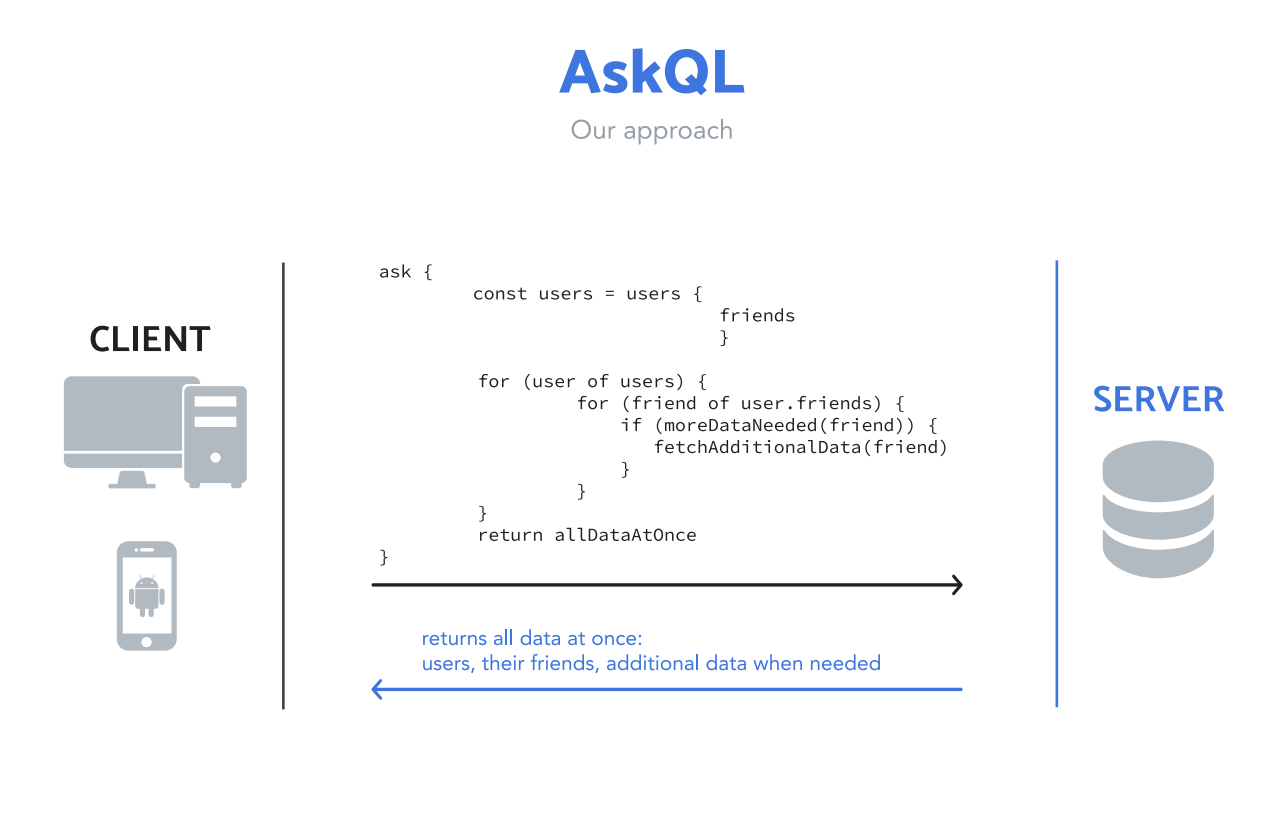
AskQL is a new query and programming language that can express any data request.
Send executable code instead of JSONs.
- Asynchronous by default
- Processes only immutable data
- Based entirely on the functional programming paradigm
- Next milestone after GraphQL and REST API
- Send code to servers without the need to deploy
- New safe query language
- Compiled to clean functional code
node >=12.14
In your Node project run:
npm install askql
Sample index.js file:
const askql = require('askql');
(async () => {
const result = await askql.runUntyped(
{ resources: askql.askvm.resources },
askql.parse("ask { 'hello world!' }")
);
console.log(JSON.stringify(result, null, 2));
})();- Clone the repository
git clone git@github.com:xFAANG/askql.git
-
Install dependencies
npm i -
Build the project
npm run build -
Link the project to askql command
npm link
Now you should be able to launch the interpreter (we use REPL for that).
askql
- Write a hello world!
In AskQL we only use single quotes:
🦄 'Hello world'
string ask('Hello world')
'Hello world'
In the response you get a compiled version of the program that is sent asynchronously to the AskVM.
- There are two number types
🦄 4
int ask(4)
4
🦄 4.2
float ask(4.2)
4.2
- Let's say we have a table of philosophers and their contribution to computer science as a score:
🦄 scorePerPhilosopher
any ask(get('scorePerPhilosopher'))
{
Aristotle: 385,
Kant: 42,
Plato: 1,
Russel: 7331,
Turing: 65536,
Wittgenstein: 420
}
Now let's find out the max score with a simple query:
🦄 max(scorePerPhilosopher)
int ask(call(get('max'),get('scorePerPhilosopher')))
65536
Nice!
- Write a first query, it can be a multi-liner. First step:
.editor
second step, we write the query:
query {
philosophers
}
and here we have the answer:
any ask(query(node('philosophers',f(get('philosophers')))))
{
philosophers: [ 'Aristotle', 'Kant', 'Plato', 'Russel', 'Turing', 'Wittgenstein' ]
}
- Exit the console!
ctrl + d
You can find all the examples in __test__ folders
Find AskQL documentation here.
The Documentation is divided into 4 parts:
- AskQL Overview
- AskQL Quick Guide
- AskScript - Human Friendly Language for AskScript
- AskVM - Runtime Environment for AskQL
Do not hesitate to try it out yourself! You can also find fellow AskQL devs in our Discord community.
Similar to python or node, AskScript CLI allows the user to type AskScript programs and get immediate result.
In order to run CLI:
-
Build the code:
npm run build -
Run:
node dist/cli.js
Every input is treated as an AskScript program. For convenience, CLI expects just the body of your program, without ask{ }.
The editor has 2 modes - a default single-line mode and a multiline mode.
In order to enter the multiline mode, please type .editor.
At the end of your multiline input please press Ctrl+D.
$ node dist/cli.js
🦄 .editor
// Entering editor mode (^D to finish, ^C to cancel)
const a = 'Hello'
a:concat(' world')
(Ctrl+D pressed)
Result:
string ask(let('a','Hello'),call(get('concat'),get('a'),' world'))
'Hello world'
As the output CLI always prints AskCode (which would be sent to an AskVM machine if the code was executed over the network) and the result of the AskScript program.
JavaScript's eval( <javascript> ) is terrible at ensuring security. One can execute there any code on any resources available in Javascript. Moreover there is no control over time of execution or stack size limit.
On contrary, Ask's ask { <askscript> } runs by default on a secure, sandboxed AskVM, which has a separate execution context. We have built in control mechanisms that only allow using external resources you configured. Ask programs are also run with the limits on execution time and stack size restrictions you define.
The code in this project is licensed under MIT license.
- Marcin Hagmajer (ex-Facebook)
- Łukasz Czerwiński (ex-Google)


